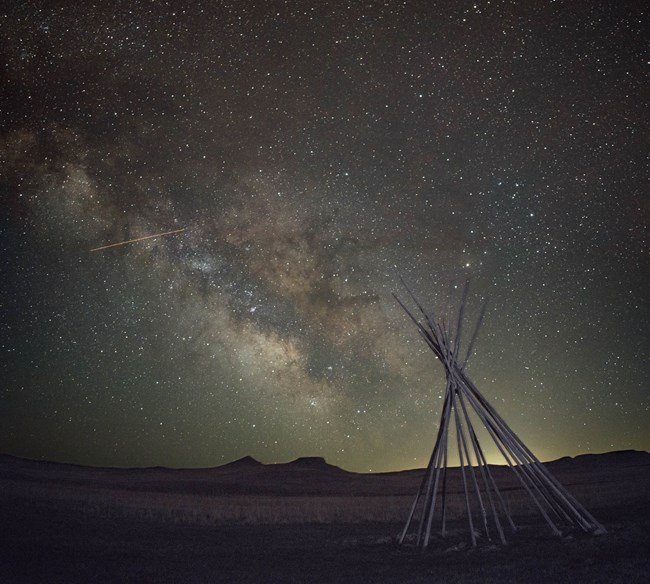
NPS Photo / Jason Gray Whether at home tonight or right here in rural Nebraska, look up into the night sky. It's much the same universe that our Miocene mammals would have seen 23 million years ago, and that humans have been gazing into for millenia. But the view from the ground has changed dramatically. Electric lighting, air pollution, and even satellites have hidden and altered the night sky. Why Should the Night be Dark?Cultures from around the world -- including the Lakota Sioux who camped in the Niobrara River Valley -- included the wonders of the night sky into their culture. The myths, legends and stories of a people were often based on how they interpreted the shapes of the heavenly bodies above them. The seasonal changes of the stars and moon kept time, when to plant, when to harvest, when to hunt, or when to move on.Plants and animals may also rely on darkness. Predators rely on darkness to stalk their prey, and prey rely on darkness to hide. Birds migrate by the stars and can become confused by bright lights. Amphibians like those in our wetlands will have difficulty finding a mate with artificial light around. We humans also need darkness for our physical health and wellbeing. Bright nighttime lights both inside and outside our homes interfere with our sleep rhythms. Cortisol and melatonin production depend on days being bright, and nights being dark. Changing those sleep patterns make us more irritable and susceptible to disease. What is Agate Fossil Beds Doing to Help?Agate Fossil Beds National Monument is 50 miles north of the Scottsbluff / Gering area, and 23 miles south of Harrison Nebraska, the closest village. Their "light domes" are visible from the park (see the yellow glow over the hills in the tipi photo to the left), and can have an adverse effect on the night sky. We have however, worked to keep artifical generated light pollution to a minimum by shading or eliminating all of the outdoor lights in the park. As part of our commitment to protecting the night sky from light polloution NPS teams monitor the darkness in the park. We also take great strides to educate local residents and ranchers to help them reduce light pollution from their operations. What Can You Do to Help?Light pollution is not inevitable. A brightly lit city, neighborhood, home or ranch is not necessarly the sign of a prosperous one. In fact, it can be a sign of inefficient use of resources and a waste of money.
When Can You See Agate Fossil Beds' Amazing Night Skies?The monument is closed from dusk to dawn, so night sky viewing is limited to during special events and ranger talks. During the summer months Agate Fossil Beds National Monument hosts several Night Sky programs. With the use of red flashlights to save your night vision, the stars are very visible to the naked eye. Occasionally, local astronomers will bring telescopes and explain to visitors the constellations and other heavenly bodies that are predominate on certain nights. Follow us on our social media accounts (including Facebook @AgateFossilBeds and Twitter @agatefossilbeds ) to learn about our next Night Sky program! |
Last updated: June 12, 2025
